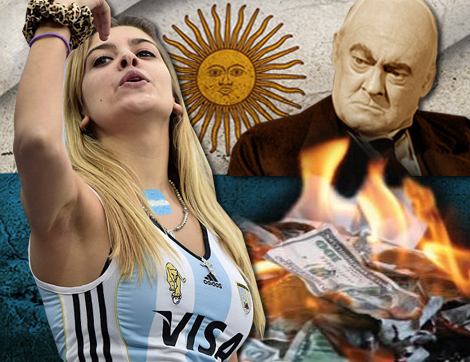
By Bill White —
Argentina may come out victorious in a battle with international moneylenders, as its central bank has stopped bleeding foreign currency reserves. Moreover, black-market prices for Argentine pesos have moved dramatically toward the official exchange rate. This follows years of uncertainty as a gang of hedge funds and their billionaire masters have tried to bully Argentina into collapse to punish it for putting the welfare of its own citizens before international bankers.
The Argentine peso has risen from a low of 15.95 to the dollar in September to 12.65 to the dollar in November, and the central bank has obtained loans valued in United States dollars and other foreign currencies since the action was compelled by the corrupt U.S. court system to default on its foreign and euro-denominated bonds this summer. This and a dramatic reduction of currency in circulation have stabilized an economic situation that once looked bleak.
Alejandro Vanoli, the new central bank president, is credited with checking the predatory attacks by vulture funds. His first move was to reduce the number of pesos in circulation by offering a 23% interest rate for three-month deposits. This brought 3 billion pesos in new deposits into Argentine banks. While the 23% interest rate puts much money into the economy, the depositing of the money prevents it from circulating, reducing the velocity of money and acting in a deflationary manner.
Vanoli then introduced the dollar-linked bond. These central bank investments brought in $983 million in U.S. dollars, helping boost foreign currency reserves, which had been depleted to $28 million. These bonds pay investments at the official exchange rate, currently 8.5 pesos per dollar, and protect against official devaluation.
Argentina then turned to China, swapping 814 million Argentine pesos for Chinese yuan. This was followed by a deal with food exporters to sell an additional $1.5 billion in soybeans and grain overseas, bringing that much more hard foreign currency into the country.
The turnaround could prove a model for other countries, like Venezuela, Iran and Russia, whose currencies have been attacked by American-linked Zionist speculators.
Argentina was pushed into default in 2001 by currency speculators like George Soros and by austerity measures imposed by the International Monetary Fund and the World Bank. Several years later, it stabilized its economy and settled its defaulted debts for about 30¢ on the dollar. However, some international speculators were not happy and wanted to squeeze every dollar they could from Argentina. They sued in U.S. courts and won a judgment from a corrupt federal judge, requiring Argentina to pay 100¢ on the dollar. While the order is only enforceable by war, the judge then froze Argentine assets in the U.S., preventing payment to any Argentine bondholder.
The asset freeze is similar to sanctions-related asset freezes targeting Iran and Russia, while Venezuela’s currency had been targeted by speculators working with U.S. intelligence agencies.
Vanoli’s real genius is twofold. First, he reduced circulation of the currency without taxes. The typical way of reducing excess currency is to tax it out of existence, but in a usury-based economy, raising interest rates, besides depressing bank deposits, increases debt payment and spurs debt repayments effectively deflating the currency. Second, by increasing trade with China, which generally doesn’t trade in yuan, Vanoli allied himself with a large economy able to provide most of Argentina’s imports. Replacing the dollar with the yuan as the standard for world trade has been a major policy goal of the Chinese.
The moves show that economic isolation from America is not the death knell for countries that it once was. In the multi-polar world, the global economy is quickly re-orienting itself around regional powers with global economies that respect national sovereignty and don’t use their economic power as a subversive weapon.
Bill White is a freelance journalist and publisher based in Virginia. He has also written articles for THE BARNES REVIEW (TBR) magazine. Bill is also the author of a new book entitled National Socialism: Yesterday & Today. Proceeds go to White’s legal defense fund.


2 Comments on Argentina Snubs Bankers; Stabilizes Own Currency